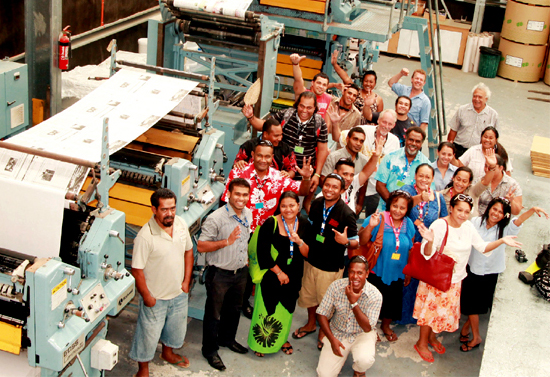
Jason Brown reports on Samoa's draft Media Council Bill for fielding public complaints.
A draft bill for a planned media complaints council in Samoa proposes significant new “public interest” protections for confidential sources currently vulnerable to exposure by law.search, data collection and analysis skills to implement a project aimed at building social accountability.
The draft Media Council Bill 2014 has been circulated to members of the media
In the draft, the controversial section 10 of the Newspaper and Printers Act 1993 is replaced with a new section. Instead of compelling, without “dispute”, any newspaper to provide a complainant all records, including the name of any confidential informant, the draft bill proposes that power be moved to the courts.
If passed, the Media Council bill would require courts to consider the effects of exposure on both the sources, and the “public interest” of journalists being able to access sources.
In a civil or criminal case, the draft reads, the court could only require newspapers to reveal a journalists’ sources “if the Court is satisfied that the public interest in the disclosure of evidence of the identity of the informant outweighs a) any likely adverse effect of the disclosure on the informant or any other person; and b) the public interest in the communication of facts and opinion to the public by the news media and, accordingly also, in the ability of the news media to access sources of fact.
Discovery provision
Currently, section 10 of the Newspaper and Printers Act 1992-1993 reads: “10. Discovery in case of defamation in newspaper – Where in any proceedings the plaintiff claims discovery of the name of the printer or publisher of a newspaper or of a matter relating to the printing or publishing thereof, including any correspondences, written materials or other sources of information whatsoever, in order to enable him or her more effectually to bring or continue an action for damages on the ground of a defamatory statement therein concerning him or her, the defendant is not to be permitted to dispute that claim, but is to be compellable to make the discovery thereby required:
“PROVIDED THAT no discovery is to be used for a purpose in a proceeding other than that in and for the purposes of which the discovery is made.”
The draft bill also requires complainants to the media council to declare, in writing, that they are not going to pursue legal action against the media organisation.
They would also have to declare that they are not going to use “any information gathered during the investigation of the complaint by, or on behalf of the Council in any future legal proceedings.”
Complainants would first have to lay a formal complaint with the media organisation, within 10 days of the report. Complaints could only be made to the Media Council if the original complaint was “not addressed satisfactorily” within five more days by the media organisation.
The draft bill provides for re-establishment of JAWS (Journalists Association of Samoa) as a body corporate funded by government, membership fees and donations.
An executive committee would be elected by members, who must be journalists and editors of media organisations.
That committee would be given powers to appoint a 10-member Media Council, to be headed by an 11th member, who must be a lawyer or judge with no less than five years experience. Appointments must be made “independently, free of any political pressure, and without regard to any political interest".
Political pressure is not however spelt out in the draft section dealing with the deliberations of the Council, mentioning only “business interests".
Promoting integrity
Under section 8 (5) of the draft bill, during any meeting of the Council, “and whenever they are acting on behalf of the Council on its business, members: (a) are expected to act in the Council’s interest and in the interest of professional journalism; and (b) must avoid acting as a delegate of any business interest, and avoid and resist receiving or accepting directions from any business interest in respect of duties to be performed under this Act.”
Overall, under section 4 of the the proposed Media Council Act, its purpose would be to “promote professional journalism and integrity in the news media, while observing the fundamental rights under Part II of the Constitution.” Part II section 13 a) of the Constitution protects the right “to freedom of speech and expression”.
Section 4 (2) of the draft requires that “This Act must be applied, implemented and enforced in a manner, which fully respects and acknowledges Samoan tradition, culture and community values.”
However, the draft does not specify equal emphasis for journalistic tradition, culture or community values. Members of the media are scheduled to meet tomorrow to discuss this draft Media Council bill.
Jason Brown is a journalist with the Samoa Observer. Published with the permission of the author.
The full Samoan draft Media Council Bill
This work is licensed under a Creative Commons Attribution-NonCommercial 3.0 New Zealand Licence.




